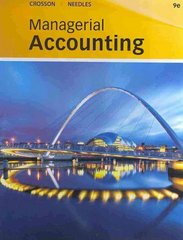Question
6. Using the double diminishing-balance method, calculate the depreciation expense for year 1 (nearest dollar without comma, e.g. 15000): Equipment was purchased for the cost
6. Using the double diminishing-balance method, calculate the depreciation expense for year 1 (nearest dollar without comma, e.g. 15000): Equipment was purchased for the cost of $765,000 on April 1. The company's fiscal year end is August 31. The equipment is estimated to have a five-year life and a $145,000 residual value. Based on experience, the equipment can produce 480,000 units of a product before it must be replaced. The budgeted numbers of units per year are: Year 1 2 3 4 5 No. of Units 95,000 175,000 145,000 90,000 65,000 When answering the following questions, don't round your figures when doing calculations to avoid rounding errors. 1. Using the straight-line method, calculate the depreciation expense for year 1 (nearest dollar without comma, e.g. 15000): 2. Using the straight-line method, calculate accumulated depreciation at the end of year 2 (nearest dollar without comma, e.g. 15000): 3. Using the units-of-production method, calculate the accumulated depreciation at the end of year 2 (nearest dollar without comma, e.g. 15000): 4. Using the units-of-production method, calculate the depreciation expense for year 4 (nearest dollar without comma, e.g. 15000): 5. Using the double diminishing-balance method, calculate the annual rate (nearest percentage without % symbol, e.g. 25)

Step by Step Solution
There are 3 Steps involved in it
Step: 1

Get Instant Access to Expert-Tailored Solutions
See step-by-step solutions with expert insights and AI powered tools for academic success
Step: 2

Step: 3

Ace Your Homework with AI
Get the answers you need in no time with our AI-driven, step-by-step assistance
Get Started


